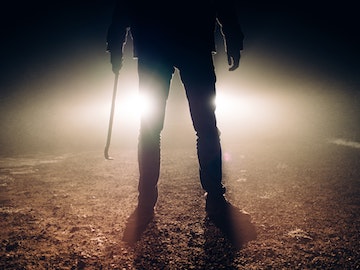 Last night my husband had a dream about a man whose life goes bad as a consequence of choosing hard drugs. We sat on the couch this morning talking about it, and our conversation brought up a memory of a recent news item about a police officer who had his head repeatedly bashed into the ground after he tried to stop violence at a drug-influenced party. My husband remarked that probably the attacker would get away with a reduced sentence because his lawyer’s defence was that he was ‘on ice’.
Last night my husband had a dream about a man whose life goes bad as a consequence of choosing hard drugs. We sat on the couch this morning talking about it, and our conversation brought up a memory of a recent news item about a police officer who had his head repeatedly bashed into the ground after he tried to stop violence at a drug-influenced party. My husband remarked that probably the attacker would get away with a reduced sentence because his lawyer’s defence was that he was ‘on ice’.
You can just see where this is going. Ice (and other hard drugs) will become the new insanity plea. But why is it okay for a police officer to go to work expecting to do his job in service of the community, and instead have his head bashed into the ground?
Perhaps it’s time for crimes like this to be assessed on the basis of prior choices, on the basis of a series of past choices rather than one drug-induced ‘bad moment’. Perhaps it’s more appropriate to view that ‘bad moment’ as being the natural consequence of a series of poor choices, for which the person is accountable, rather than viewing the chooser as the ‘victim’ of his or her choices.
‘Same same’ for all of us. Being interested in health, I immediately find myself pointing to the pattern where people choose to indulge ‘pleasure now’ and then become upset when their bodies and health ‘betray them’ in later years; surely that later ill health is just a consequence of prior choices? Should we feel sorry for the person who is experiencing a heart incident after twenty or forty years of over-indulgence or unhealthy practices, or do we take a more neutral position? Do we instead say, ‘That’s not surprising’?
It seems cruel but life is a cause-effect game. Nothing comes out of nowhere; everything has seeds that are rooted somewhere, and healing requires some degree of responsibility.
When I left my 29-year relationship so suddenly it probably looked like I had treated my long-time partner badly, but that decision was some twenty-five years in the making; it was the outcome of lots of little choices over those years. He had made choices not to create a shared vision for our family, not to participate in various family activities, not to invest more in our relationship… But because there was also a lot of love and affection and honesty between us, those ‘not to’ choices got lost in the tide of events. It wasn’t until life landed a surprise new man at my feet that I had to weigh and evaluate all the moments of the previous twenty-nine years in order to make my decision.
This is an uncomfortable blog to write, and perhaps to read as well. We are biased towards being kind and nice, and towards avoiding confrontation and conflict; but often that means we avoid responsibility, which is one of the most enriching states of mind that we can enter.
So how best can we support each other in being responsible, in making the choices that best serve us and the people around us? We will not suddenly, magically, create a world in which everyone makes the best choices all the time; but we can create educational models in which life skills are prioritised. (My old hobby horse.)
We can insist that our schools prioritise life skills such as communication and conflict resolution skills and financial management; we can expose our children to the real-life stories of people who made poor choices and people who made good choices; we can rank this sort of education even more highly than other subject areas simply because everyone needs to communicate and everyone needs to be responsible for their choices, no matter what their vocation.
Let’s give our children a fighting chance against the scourge of unhappy consequences. Let’s empower them with the sort of education and support that enables them to make the small everyday choices that lead them in the direction of an inspiring life.


Recent Comments